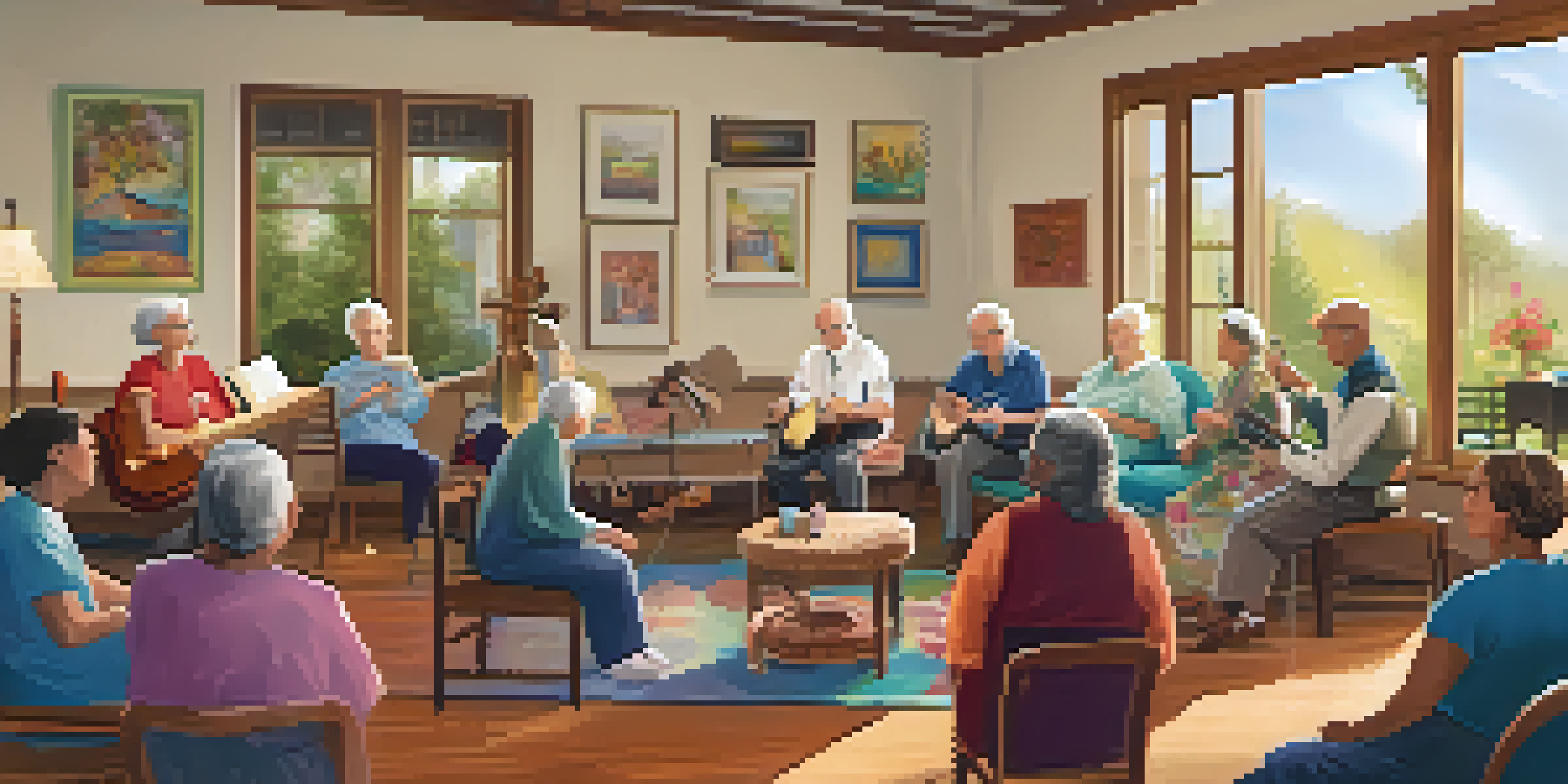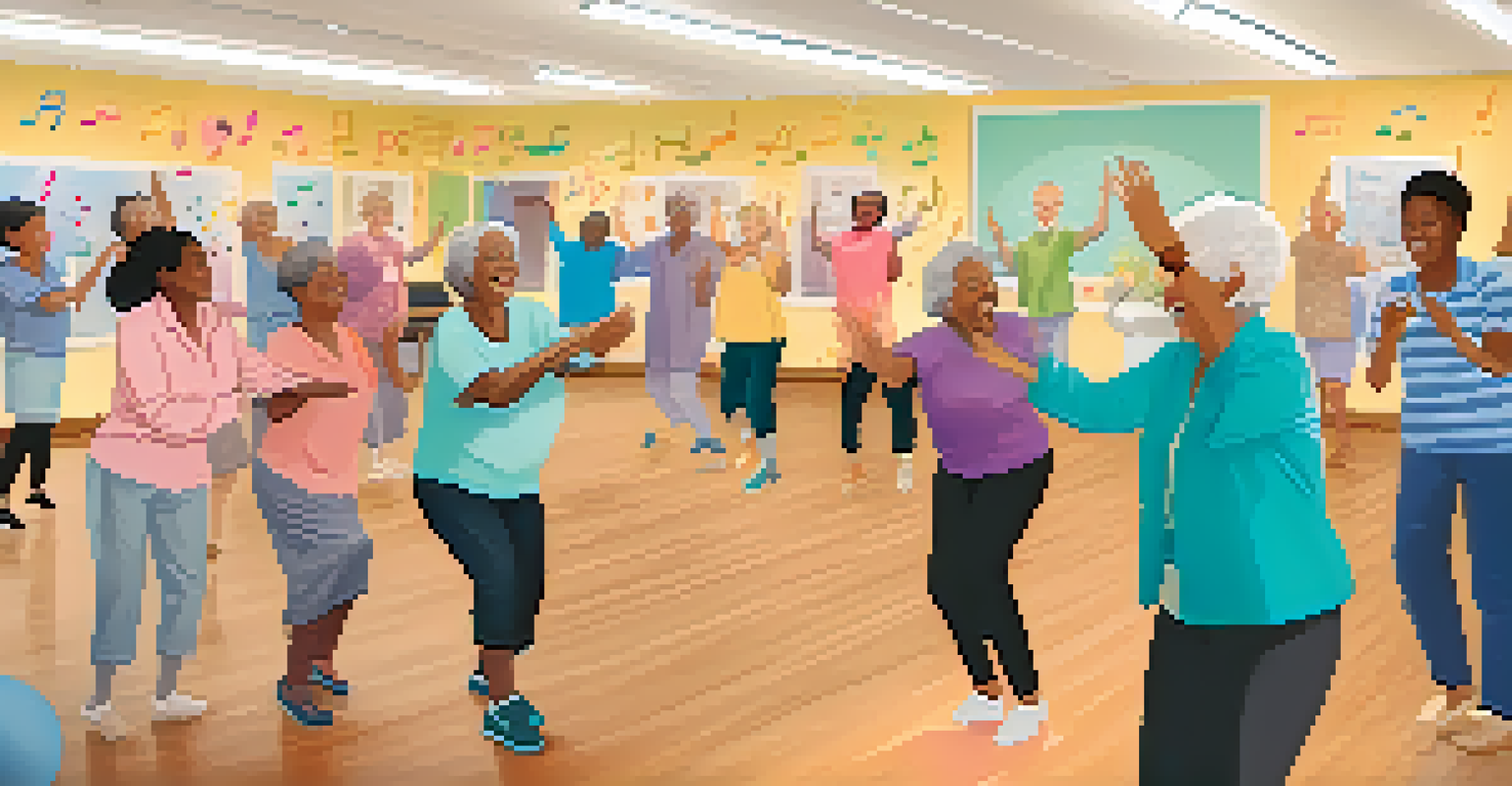Creating a Music Therapy Program for Seniors with Dementia

Understanding Dementia and Its Impact on Seniors
Dementia is a broad term that describes various symptoms affecting memory, thinking, and social abilities. For seniors, this can mean a decline in cognitive function, leading to challenges in everyday life. Understanding how dementia manifests is crucial for caregivers and family members to provide the best support.
Music can change the world because it can change people.
As dementia progresses, individuals may lose their ability to communicate and connect with others. This isolation can lead to increased feelings of sadness and anxiety. It's essential to recognize these emotional challenges and seek ways to engage seniors meaningfully.
Music therapy has been shown to help seniors with dementia reconnect with their emotions and memories. By providing a familiar and comforting medium, music can serve as a bridge to improve communication and reduce feelings of isolation.
The Benefits of Music Therapy for Seniors
Music therapy has a myriad of benefits for seniors, particularly those living with dementia. Research indicates that music can stimulate brain activity, helping to enhance memory recall and emotional expression. This means that even familiar tunes can evoke memories long forgotten.

Additionally, music therapy can improve mood and reduce anxiety. Engaging with music—whether through listening, singing, or playing instruments—can foster a sense of joy and belonging among seniors. This is particularly important for those who may feel isolated due to their condition.
Dementia's Emotional Challenges
Understanding and addressing the emotional challenges faced by seniors with dementia is crucial for providing effective support.
Moreover, music therapy can promote social interaction. Group sessions encourage seniors to connect with one another, breaking down barriers caused by cognitive decline. This social engagement can lead to improved overall well-being and a sense of community.
Setting Goals for Your Music Therapy Program
Before launching a music therapy program, it's important to define clear goals. Consider what you hope to achieve, such as improving memory recall, enhancing emotional well-being, or fostering social connections among participants. Setting specific, measurable goals will help guide your program's development.
Where words fail, music speaks.
For instance, if your goal is to improve communication skills, you might focus on sing-alongs that encourage verbal participation. If emotional expression is the aim, consider incorporating music that resonates with the participants' past experiences. This targeted approach can lead to more meaningful outcomes.
Regularly reviewing these goals will also ensure that the program remains relevant and effective. As seniors respond to the therapy, be open to adjusting your objectives to better meet their evolving needs and preferences.
Choosing the Right Music for Your Program
Selecting the right music is crucial for a successful therapy program. Familiar songs from a participant's youth are often more effective than contemporary music. Consider the age group and cultural background of the seniors when curating your playlist to maximize engagement and emotional resonance.
Incorporating a variety of genres can keep sessions fresh and enjoyable. From classical to jazz, each style can evoke different feelings and memories. It’s important to introduce new music occasionally to stimulate interest while maintaining a foundation of familiar tunes.
Music Therapy Enhances Well-Being
Music therapy can significantly improve mood, memory, and social interactions among seniors living with dementia.
Additionally, be mindful of the tempo and lyrics of the songs chosen. Calming, slower melodies may help soothe anxiety, while upbeat songs can energize and uplift participants. Balancing these elements can create a well-rounded musical experience.
Designing Engaging Activities Around Music
Creating effective music therapy sessions involves more than just playing songs. Engaging activities can include singing, dancing, or playing simple instruments. Such activities encourage participation and help seniors express themselves in a fun and supportive environment.
Consider incorporating storytelling with music, where participants share personal anecdotes related to the songs being played. This not only stimulates memory but also fosters connection among group members as they relate to one another's experiences.
Additionally, elements like rhythm games or music-based exercises can further enhance engagement. These activities can help improve motor skills and coordination while keeping the atmosphere light and enjoyable.
Creating a Comfortable Environment for Sessions
The environment in which music therapy takes place can significantly impact its effectiveness. A comfortable, welcoming space can help seniors feel at ease and open to participation. Consider factors like lighting, seating arrangement, and minimizing distractions to create an inviting atmosphere.
Incorporating personal touches, such as familiar items or decorations, can make the space feel more relatable. This familiarity can help seniors connect more deeply with the music and the experience. Creating a sense of belonging can lead to more positive outcomes.
Engaging Activities Boost Participation
Incorporating engaging activities around music therapy fosters participation and helps seniors express themselves in a supportive environment.
Additionally, ensure that the sessions are accessible to all participants, considering mobility issues or hearing impairments. Providing adaptive instruments or seating options can make a big difference in fostering active participation and enjoyment.
Evaluating the Success of Your Program
To ensure the effectiveness of your music therapy program, regular evaluation is essential. Gathering feedback from participants, caregivers, and facilitators can provide valuable insights into what works and what may need adjustment. Consider using surveys or informal discussions to gather this information.
Observing participants during sessions can also reveal how they respond to different activities and music selections. Look for signs of engagement or emotional responses, as these indicators can help gauge the program's impact.

Finally, be prepared to adapt your program based on this feedback. Flexibility is key in creating a successful music therapy experience that meets the unique needs of seniors with dementia.